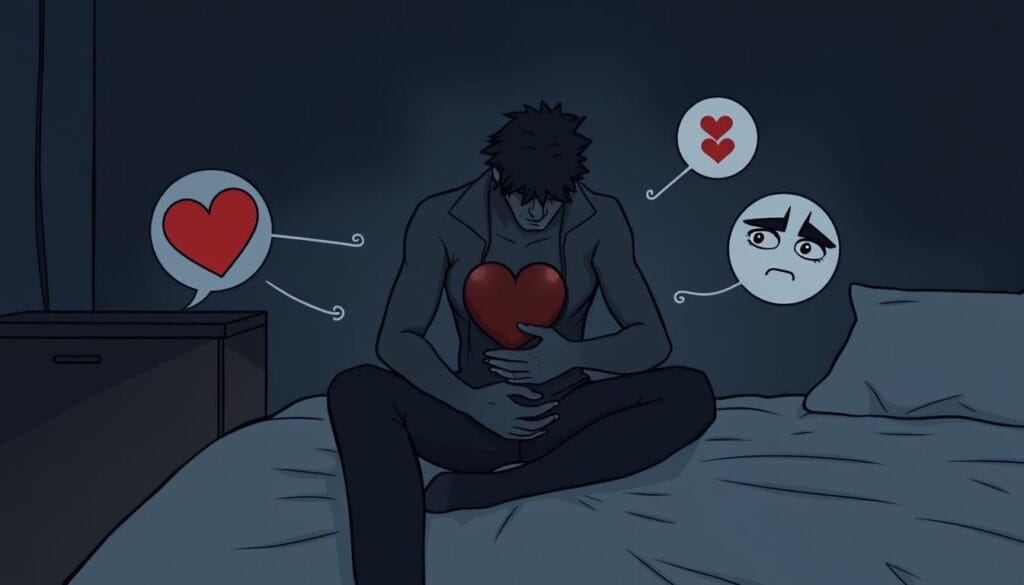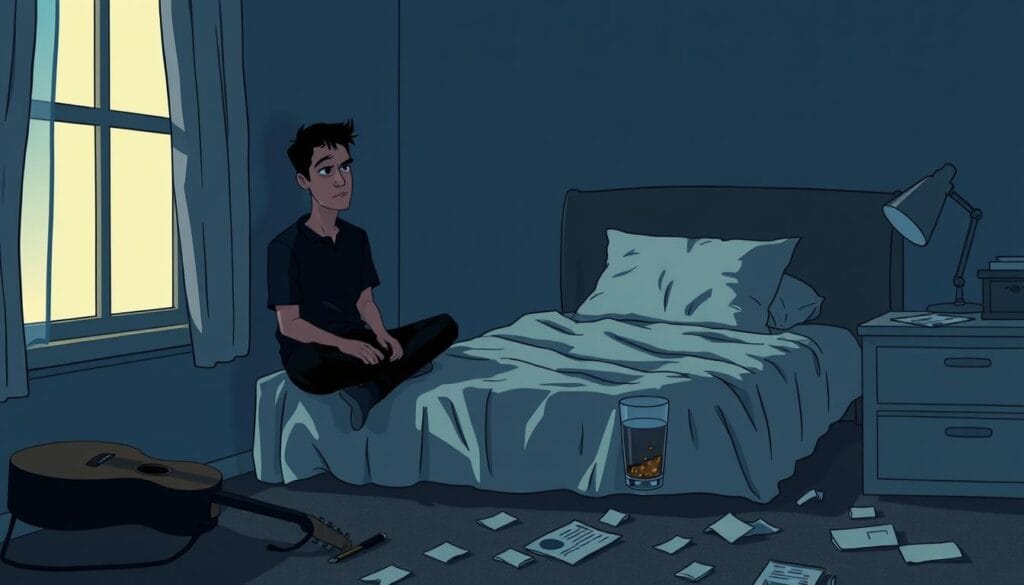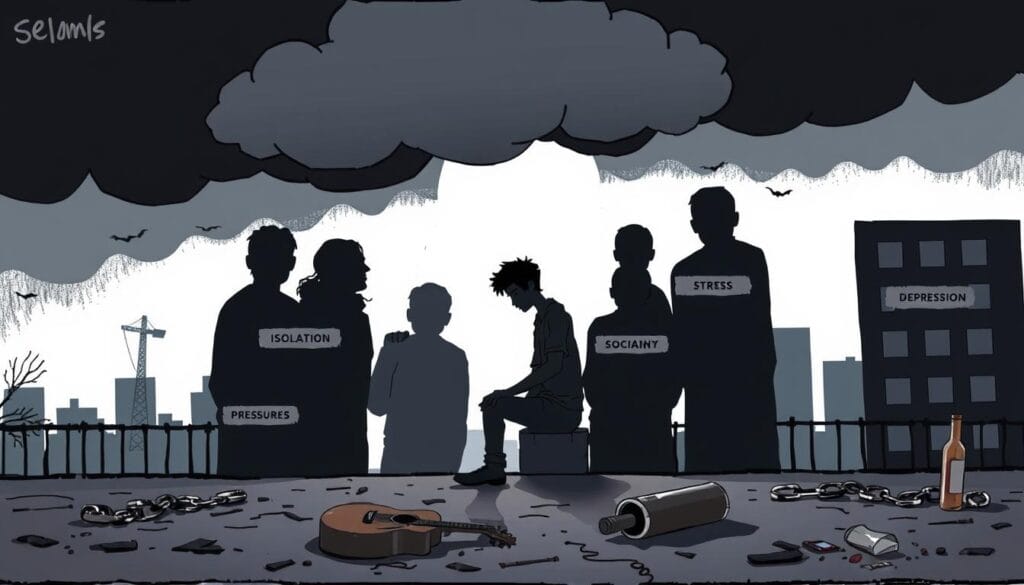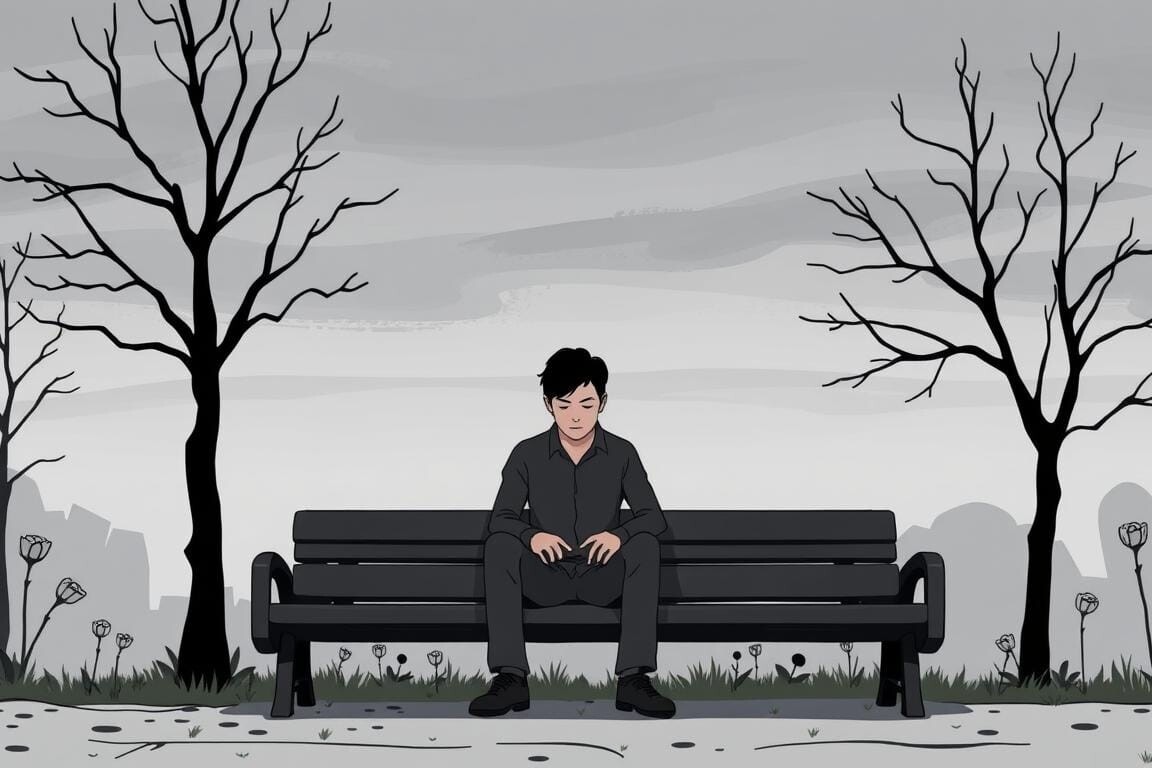Depression is a serious mental health issue that affects many people. It can change how someone feels and lives their life. Dr. Chandril Chugh explains how depression shows up differently in men and women. He talks about the challenges men face and the ways to help them.
Depression looks different in men and women. Women often feel sad and worthless. Men might feel tired, angry, or turn to drugs. It’s important to know these signs to help them early.
Men also face special challenges because of what society expects. They might think they can’t show weakness. Knowing these issues helps us support men better and fight the stigma of depression.
Table of Contents
ToggleUnderstanding Depression in Men
Depression in men is often overlooked or misunderstood. This is because of the male depression stigma and how society views men’s mental health. Many men feel they must be strong, stoic, and not show emotions. This makes it hard for them to ask for help or talk about their depression.
Unique Challenges for Men
Men with depression face special challenges. They might struggle to share their feelings, worry about being seen as weak, and lack strong support. These issues can make depression worse and make it harder to get better. It’s important to understand these challenges to help men with their mental health.

Stigma and Societal Expectations
The idea that men should be tough and not show emotions is a big problem. This stigma stops men from getting help, leading to worse mental health issues. We need to change these harmful ideas and encourage men to talk about their feelings. This will help create a more supportive and welcoming place for everyone.
Physical Symptoms of Depression in Men
Depression in men can show up in many ways, not just in how they feel. It can also affect their body. Signs like constant tiredness, pain, and stomach problems are real and serious. It’s important to notice these signs to help men get better.
Fatigue and Sleep Disturbances
Men with depression often feel very tired. They might feel exhausted even after sleeping a lot. Problems sleeping, like not being able to sleep or sleeping too much, are also signs.
These sleep issues make it hard to stay awake and do daily tasks. It’s a big challenge for those dealing with depression.
Pain and Digestive Issues
Depression can also cause physical pain and stomach problems. Men might feel pain without a clear reason or have headaches and cramps. Changes in appetite, feeling sick to their stomach, or having trouble going to the bathroom are common too.
These symptoms can really affect a man’s life. They shouldn’t be ignored because they can make a big difference in how well someone feels.

It’s key to recognize the physical signs of depression in men. This way, they can get the right help sooner. Doctors can treat both the emotional and physical parts of depression. This helps men get better in a more complete way.
Emotional and Behavioral Signs
Depression can show up in many ways, not just physical symptoms. It can also change how men feel and act. Knowing these signs is key to spotting depression and getting help.
Men with depression might feel sad, angry, or irritable. They might stop enjoying things they used to love. They could also pull away from friends and family.
They might take more risks, like driving too fast or using drugs. This is another sign of depression in men.
Men often hide their emotional signs, focusing on physical problems instead. This makes it hard for doctors to see the depression.
Depression affects everyone differently. Men might handle it in ways that are unique to them. Getting help from a professional is crucial for the right diagnosis and treatment.

Risk Factors for Depression in Men
Depression can affect anyone, but some factors make men more likely to get it. Knowing these factors helps us spot men at risk. We can then offer them the support and help they need.
Age and Life Transitions
As men get older, they go through big changes. Losing a job or facing a major life change can be tough. These events can make men feel uncertain and lost, raising their risk of depression.
Substance Abuse and Addiction
Using substances can increase a man’s risk of depression. Some men might use drugs or alcohol to cope with their feelings. But this can make things worse. It’s important to treat both the addiction and depression together.
Knowing these risk factors is key to helping men with depression. By understanding the challenges men face, we can offer better support. This can help reduce depression and improve their overall health.

The Impact of Untreated Depression
Untreated depression in men can cause big problems. It can hurt personal relationships and work-life balance. It can also lead to other mental health issues like anxiety or substance abuse.
Relationship and Work-Life Challenges
Depression can harm a man’s personal and work life. It can make relationships with loved ones and colleagues tough. Depression can make a man feel distant, irritable, and hard to talk to.
At work, depression can make it hard to be productive and focused. It can also make it hard to do his job well.
Co-occurring Mental Health Conditions
Men with untreated depression are more likely to get other mental health issues. This includes anxiety disorders or substance abuse problems. These issues can make depression symptoms worse and harder to manage.
It’s important for men to seek help for depression. This can help them keep a healthy and happy life. By addressing depression, men can improve their relationships, work-life balance, and mental health.
Seeking Help and Breaking the Stigma
Getting help for depression in men is hard because of the stigma. But, it’s key for men to fight this stigma and care for their minds. By sharing their stories, men can help change the way society views mental health.
Healthcare, support groups, and community resources are crucial. They help men find the help they need and learn to manage their depression. It’s vital to break the stigma so men feel okay asking for help and can get better.
It’s important to teach people about mental health and start open talks. Joining groups like NAMI can help. It gives men a safe place to talk and find support.
Getting treatment can find the root of depression and make life better. Therapists and doctors offer proven ways to help. They provide a safe space for men to talk about their mental health.
By speaking up and taking action, men can get better and help others too. This makes society more supportive and understanding for everyone with mental health issues.
Treatment Options for Men with Depression
Dealing with depression can feel overwhelming. But, there are many ways to get help. Therapy and counseling, like cognitive-behavioral therapy (CBT), can help you understand and change negative thoughts and behaviors. Medication, when given by a doctor, can also help manage your symptoms.
There are also holistic ways to help you feel better. Doing regular exercise, practicing mindfulness, and making healthy lifestyle changes can boost your mood and mental health. By trying different treatments, you can find what works best for you.
Therapy and Counseling
Talking therapies, like CBT, can help you see and change negative thought patterns and behaviors. A therapist or counselor can offer a safe place to talk about your feelings. They can help you learn new ways to cope and become stronger.
Medication and Holistic Approaches
Antidepressant medications, given by a doctor, can help balance your brain’s chemicals. Holistic methods, like yoga, meditation, and eating better, can also help. These can make your treatment plan even stronger.
There’s no single way to treat depression. By working with your healthcare team, you can find the best treatments for you. This way, you can take charge of your mental health and feel better again.
Conclusion
Depression is a complex issue that affects many men. It can change their lives in big ways. We need to understand the symptoms, risks, and challenges men face with depression.
By working together, we can help men feel less ashamed about their struggles. We can offer better support and resources. This way, men can focus on their mental health and get the help they need.
With more awareness and understanding, we can create a supportive space for men with depression. This can help them get the care they deserve. By tackling depression in men, we can reduce the number of suicides in the U.S. each year.
It’s important to remember that depression is treatable. With the right support, men can overcome their mental health challenges. By prioritizing mental health and seeking help, men can improve their lives and find happiness.
FAQ
What are the unique depression symptoms that men may experience?
Men with depression often feel very tired and have trouble sleeping. They might also feel pain or have stomach problems without a clear reason. They might feel sad, angry, or just not care about things they used to enjoy.
How does societal stigma and gender-based expectations impact depression in men?
Men are often expected to be tough and not show emotions. This makes it hard for them to talk about their feelings or get help. The shame around mental health can stop men from seeking the help they need.
What are some of the risk factors that contribute to depression in men?
Depression in men can be linked to getting older and big life changes. It can also be caused by using too much alcohol or drugs. Knowing these risks helps find men who might need help and support.
What are the potential consequences of untreated depression in men?
Depression left untreated can hurt relationships and work life. It can also lead to other mental health problems. It can really affect a man’s life, health, and success.
What are the treatment options available for men struggling with depression?
Men with depression have many ways to get better. They can try therapy, like CBT, or take medicine. They can also try exercise, mindfulness, and changing their lifestyle. Finding the right treatment is important for each man’s needs.
Source Links
About The Author

Medically reviewed by Dr. Chandril Chugh, MD, DM (Neurology)
Dr. Chandril Chugh is a U.S.-trained, board-certified neurologist with expertise in diagnosing and managing neurological disorders, including migraines, epilepsy, Parkinson’s disease, and movement disorders. His clinical focus includes evidence-based neurological care and patient education.
All content is reviewed for medical accuracy and aligned with current neurological guidelines.




